Part 40: Europa Universalis III: Chapter 10 - Swabia's Century: 1480 - 1500
1480 - 1500: Swabia's Century
The Imperial Army Standards Act passes in the Reichstag with a narrow majority, and Swabia's officer corps immediately begin to implement the new drilling and training techniques to good effect.

The war with the Hammadid continues for a few more years, with the Hammadid withdrawing from the front lines and refusing to engage the Swabians at all, allowing Werner to occupy large slices of Aragon. In January of 1482, he finally has enough victories under his belt to bring the Hammadid to the peace table. The Caliphate is forced to cede the Dauphinian province of Lyonnais, which is returned to the grateful Elector-Prince of Dauphine.


More good news for Swabia arrive in February of 1484, as the last male member of the Hohenzollern Pommeranian dynasty dies out, resulting in Pommerania's throne being passed to Emperor Werner.

In summer of the same year Byzantine Empire is once again thrown into a disastrous civil war between the Byzantine Emperor and a family claimaint. With Byzantium torn apart from within, Syria exploits the power vacuum to invade Jerusalem, defeating King Adalbert's armies and annexing large tracts of Jerusalem's territory.
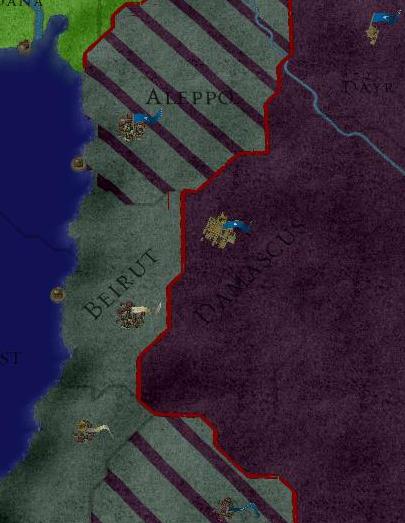
The general upset about Werner's annexation of Milan finally dies down in 1485, and Werner is quick to make use of the situation by annexing the Duchy of Baden.


He is successfully able to argue his right to Baden in front of the Reichstag on account of its centuries-long history as a part of Swabia-Baden-Bavaria, and the move meets with little opposition. A great celebration is arranged in Württemberg to welcome the people of Baden 'home'.
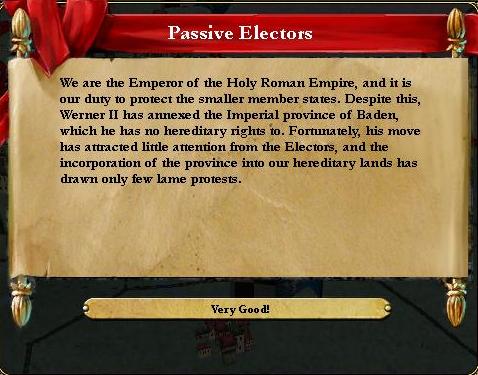
A period of relative stability settles in, and Werner uses the extra tax from Swabia's newly acquired territories to radically increase the size of the standing Imperial Army from 28,000 to 42,000 men.

In 1487, war breaks out between France and Hammadid.

With the Caliphate still not fully recovered from its war with Swabia, the war turns into a swift and decisive victory to France, which takes the province of Perigord in the peace negotiations, effectively dividing Hammadid's Aquitainian holdings in two.


All the while, the tug war for the Curia continues with bribes and counter-bribes.

Later the same year, the Elector of Verona annexes his vassal, the County of Ravenna. Ravenna was a state of little consequense, and Werner lets the matter slide.

For all of Werner's efforts, a confrontation with France cannot be put off forever, and in August of 1491, France declares war against the member state of Gelre.

Naturelly, Werner joins the war on Gelre's side. Even with the expanded Imperial Army, France and its allies outnumber the Imperial side by almost two to one, but Werner has one major advantage on his side - the French people and soldiery are worn out from its constant wars, and a protracted war might turn their discontent into open rebellion.

The 28,000 Imperial troops stationed in Mainz and Pfalz for just such an occasion immediately advance into the French Rheinland, capturing Koblenz and engaging a large French army in Trier.

The French levy troops turn out to be no match for Swabia's disciplined and well-led soldiers, and several of their armies sent against the Swabians are repelled with horrendous losses.
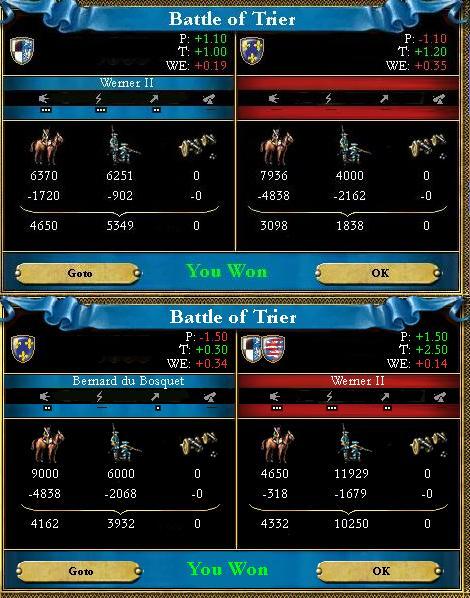
Several Italian minors are allied with France, and on top of those, Sicily and Verona have joined the war on France's side, throwing North Italy into turmoil as a dozen factions battle for supremacy among its fractured borders.
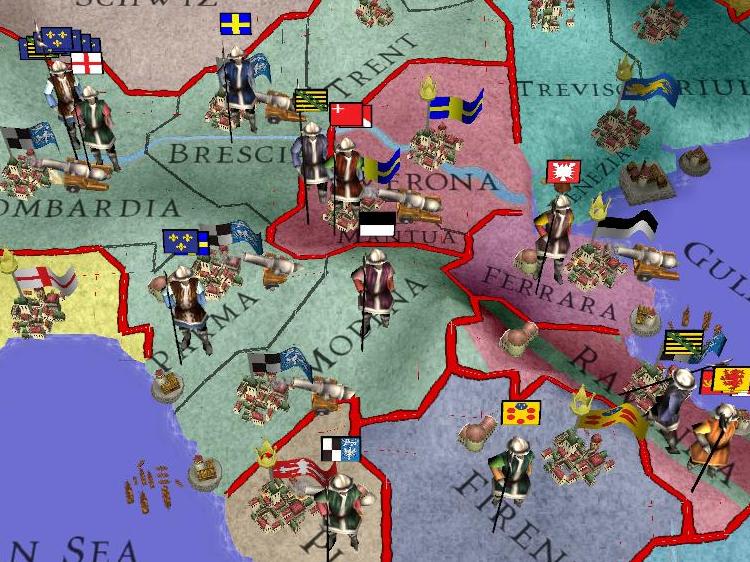
Sicily-Verona is the first to fall, as Swabian troops seize Ravenna, forcing Sicily to sue for peace and cede it to Swabia.

Dauphine and Gelre are next to the chopping block, both being forced to sign humiliating peace agreements with France, the latter even being forced to swear allegiance to the French King Charles VII.

A vengeful Elector-Prince of Verona manages to whip up a protest among his fellow Electors over Werner's annexation of Ravenna, despite the fact that Verona was the aggressor in the war against Swabia. Werner ignores the protests, creating yet another large-scale diplomatic incident.

Pisa falls in February of 1493 and sues for peace with Werner. Lacking any ambitions of conquest on Pisa and happy to deprive France of allies, Werner agrees.
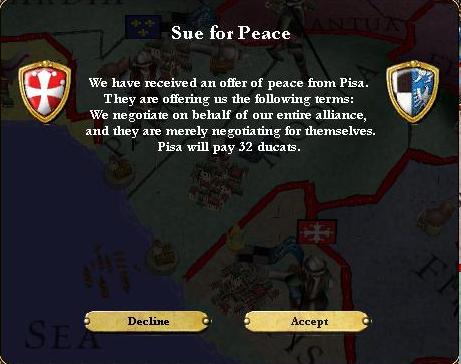
Further to the south, large number of French troops have made landfall in Naples, seizing Napoli and Abruzzi. Having no troops that can be spared at the moment, Swabia is forced to accept the loss... for now.

Back in the Rheinland, Trier and Worms have fallen to Swabian troops. The French, however, have assembled a massive army which enters Trier in May. Werner and General Sülzla fight a successful tactical retreat, inflicting punishing casualities on the French and then withdrawing to Worms.

The King of Scandinavia makes an interesting offer to Werner in June, suggesting a marriage alliance between his eldest daughter and Konrad's only son Ernst to be founded when the current war is over. Only too happy to turn a potential border threat into an ally, Werner agrees, though doing so damages relations with England, which views Scandinavia as a major rival for dominance of the seas.

By November, the 3rd army has finally cleared Northern Italy of the many hostile troops infesting it, wiping out several Genoese and Savoyan armies in the process.

In the Rheinland, Werner and Sülzla have had time to reinforce their armies, and launch a counter-attack against the large French army that drove them out of Trier.
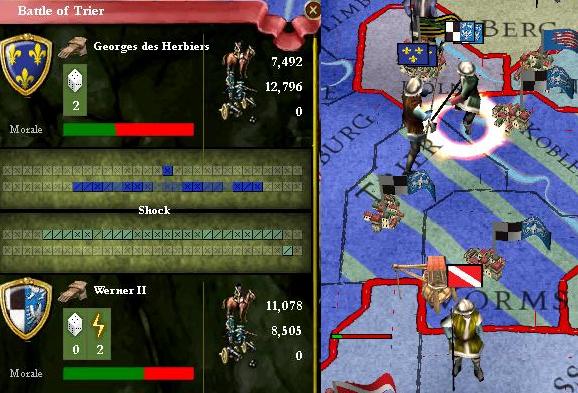
Despite having the numbers, the French suffer a crushing defeat as their center gives way before the Swabian cavalry. The entire French army routs, and Swabia pursues it into Liége, where he successfully encircles and destroys the enemy, taking a full third of the French army out of commission, deeply shocking the French leadership and crippling French morale.

By summer of 1494, North Italy is pacified, the 3rd army is marching across Sicily, and Swabian forces are advancing steadily across France, French armies scattering
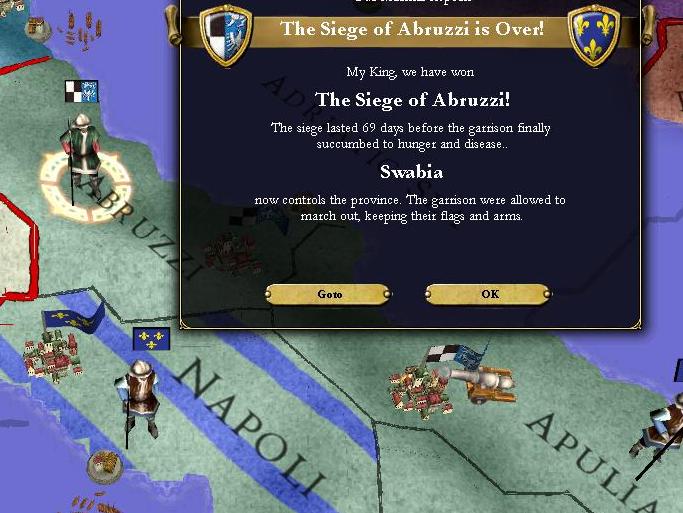
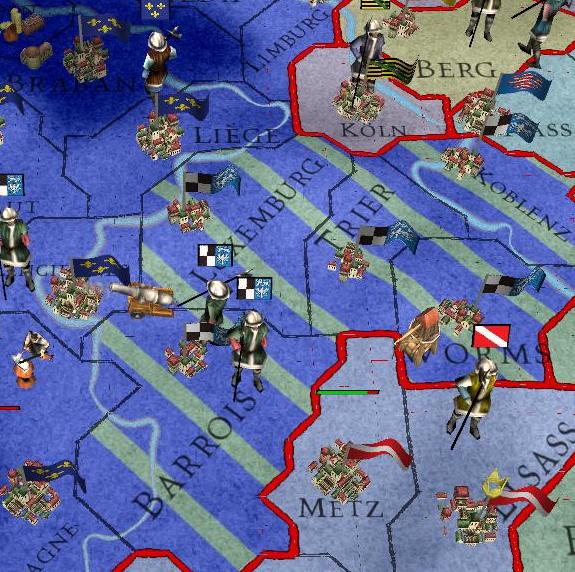
France's war exhaustion has hit the breaking point, sparking peasant rebellions all over its territory. A large peasant army even manages to seize control of Paris, slaughtering the local garrison.

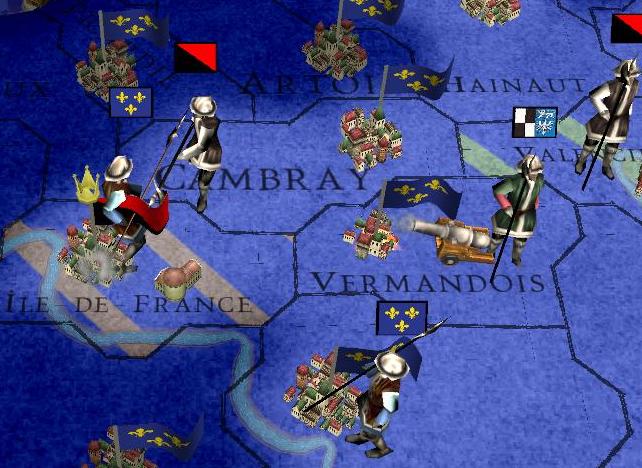
A distraught Charles VII asks Werner for a white peace - and is rejected. Werner has no intention of giving up when he's winning.

The last French army between Werner and Paris is swept aside, and Swabian troops swarm across the French capital's walls.


Despite a diminished garrison and low morale, the Parisians succeed in holding back the first assault, stubbornly defending their city for a full six months, before they are finally overcome by french Swabian reinforcements. Angry over the city's stubborn resistance, Werner lets his troops loose. Like a giant swarm of locusts, the Imperial Army pours into Paris, looting and pillaging. After a three-day bloodbath, Werner finally takes back control over his troops, installing himself in Paris' Royal Palace and sending Charles VII his terms.
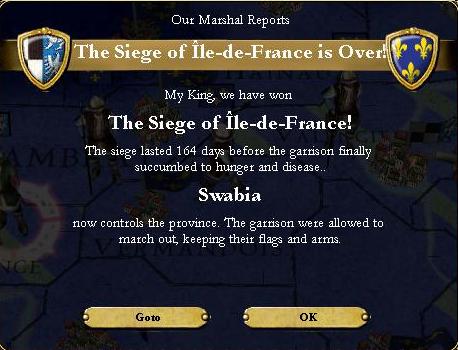
In exchange for peace, Charles VII is forced to cede the entirety of the French Rheinland to the displaced Trier branch of the von Andechs family. In addition, Werner picks out a few select pieces of art and valuables from Charles' own palace for himself.
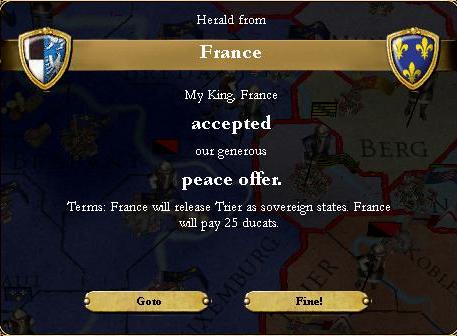
Karl von Andechs travels in triumph from his cousin's court in Brandenburg to his ancestral lands, assuming the title Duke of Trier, and swearing an oath of vassalage to Waldemar as King of Swabia. After centuries of occupation, the French have been ejected from the Rheinland!
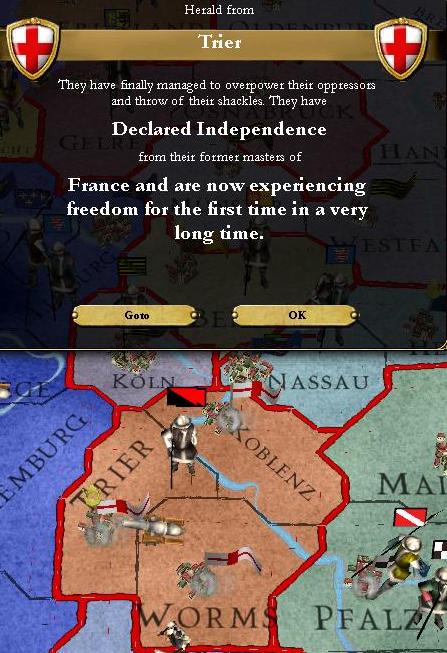

France in the aftermath of war is a land in turmoil. Having lost a full half of its army in the war, it now finds itself the victim of its own aggressive policies, as discontent minorities rise in every border province, demanding independence and freedom from Charles VII's crushing taxes.

Several rebellions even spill over the border into Alsace, forcing Werner to send the Imperial Army to defend the lands of his vassal.

In the east, a war is sparked between Hungary and Bulgaria, dragging in Austria on Bulgaria's side and Bohemia and Sopron on Hungary's.

The war turns into a disaster for Hungary and its allies, as the professional Austrian army, modelled on Swabian ideals, utterly defeats its neighbours, annexing large tracts of lands, even going so far as to fully annex its fellow Electorate Sopron. Werner protests, but is still in disfavor over Ravenna, and the Reichstag rules for Austria.

In total, Austria gains four new territories, increasing its size by a full third and propelling it to a strong second place in terms of size and wealth within the Empire.

Karl Heber, a famous Austrian philosopher who has fallen in disfavour with the King of Austria, arrives in Mainz in 1499. Quickly becoming an influential figure in the court, he begins to urge Werner as Western Roman Emperor to look to the Eastern Roman Empire and to the ancient philsophers for inspiration on how to rule.
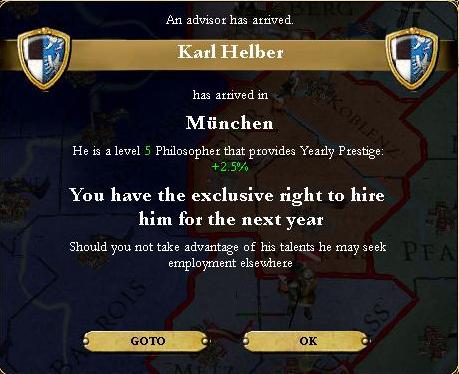
Karl Heber is a part of a new cultural wave spreading across Europe. Originating from a renewal movement in the Byzantine Empire and commonly called the Reinaissance, it espouses the intellectual, humanistic and cultural teachings of ancient Greece and Rome, bringing with it a wave of technological and artistic innovation.

To the west, rumors are spreading of a new continent, discovered by Moroccan sailors trying to find a shorter route to China. The Hammadid have already staked claims to the new discoveries and England and Scandinavia are preparing to mount their own expeditions.

King Werner passes away in November of 1499, leaving the throne to his son Ernst, a spoiled and arrogant young man with little talent or ambition.

A century has passed since the Golden Bull was proclaimed, a century that has seen Swabia grow from a Duchy within an unstable Germany to a great power in its own right, a century that has seen the Hohenzollern dynasty secure hegemony over the Imperial crown and lands. A century that has seen mighty France humiliated at the hands of the Swabian Imperial Army.
It has been a long and bloody century.
It has been Swabia's century.
